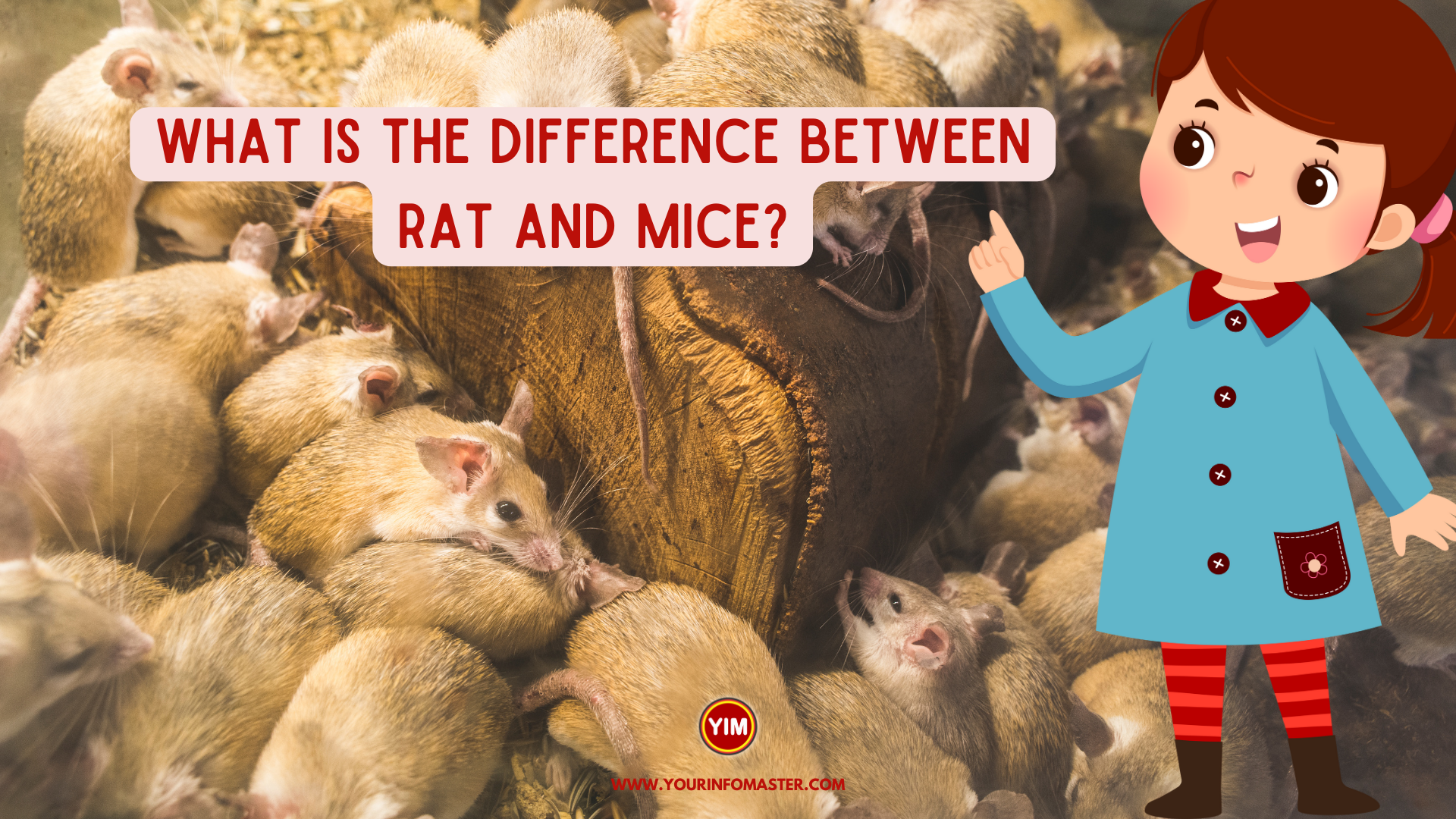I am going to explain the blog post “What is the difference between rat and mice?“
Rats and mice are two of the most common rodents that we often see around us. Although they belong to the same family, Muridae, they are different in many ways.
In this blog post, we will discuss the differences between rats and mice in detail. Understanding these differences can help you identify which of the two rodents you are dealing with and take appropriate measures to control them. So, let’s explore the differences between rats and mice!
Check also: What is the difference between DUI and DWI?
10 Differences between rat and mice
Here is a list of 10 differences between rat and mice:
- Size
- Appearance
- Behavior
- Diet
- Habitat
- Reproduction
- Lifespan
- Disease
- Droppings
- Control
Check also: What’s the difference between distilled water and purified water?
Detail of 10 Differences between Rat and Mice
Here is the detail of 10 differences between rat and mice:
Size
As mentioned earlier, rats are larger than mice. The average size of a rat is around 9-12 inches in length, while the average size of a mouse is 3-4 inches. However, it’s important to note that there are different types of rats and mice, and their size can vary based on the species.
Appearance
Rats and mice have distinct appearances that make it easy to identify them. Rats have a more extended and thicker tail than mice, and their bodies are usually bulkier. Rats also have larger heads and feet than mice. Mice, on the other hand, have a longer and thinner tail, and their bodies are slender.
Behavior
Rats are more aggressive and bolder than mice. They are known to attack humans and other animals if they feel threatened. Rats are also more likely to explore new environments and are less afraid of new objects. They are also more likely to be active during the night, while mice are more active during the day.
Diet
Both rats and mice are omnivores, but their diet preferences differ. Rats are known to be more opportunistic and will eat almost anything, including meat, fish, grains, and seeds. Mice, on the other hand, primarily feed on grains and seeds.
Habitat
Rats and mice have different habitat preferences. Rats are often found in sewers, basements, and other damp and dark places. They prefer to burrow and create nests in these areas. Mice, on the other hand, prefer to live in homes, fields, and woods. They usually create nests in areas that are warm and cozy, such as inside walls, attics, or in piles of debris.
Reproduction
Rats and mice have different gestation periods. The gestation period for a mouse is around 21-23 days, while it takes around 21-24 days for a rat. Both rats and mice can give birth to litters of offspring, with the number of offspring varying based on the species.
Lifespan
Mice have a shorter lifespan than rats. A mouse typically lives up to 2 years, while a rat can live up to 3 years. However, the lifespan of both rodents can vary based on their living conditions and other factors.
Disease
Both rats and mice can carry diseases that can be harmful to humans. However, rats are more likely to transmit diseases than mice. Rats can transmit diseases like Leptospirosis and Hantavirus, while mice can transmit diseases like Salmonella and Lymphocytic Choriomeningitis.
Droppings
Rat droppings are larger than mouse droppings. Rat droppings are about the size of a raisin, while mouse droppings are about the size of a grain of rice. Both types of droppings can be used to identify the presence of rodents in an area.
Control
Controlling rats and mice require different approaches. Since rats are larger and more aggressive, they require stronger and more extensive control methods. These can include setting up traps, using baits, and sealing off entry points. Mice, on the other hand, can be controlled using traps and baits, but the methods used for rats may not be as effective for mice.
Check also: What’s the difference between a tux and a suit?
Conclusion
In conclusion, there are several differences between rats and mice that can help you identify which of the two rodents you are dealing with. Understanding these differences is important when it comes to controlling and preventing infestations.
While both rats and mice can be harmful and carry diseases, they require different methods of control. By using the appropriate methods, you can keep your home and environment safe from these pesky rodents.
See also: What is the difference between Squid and Octopus?
If you really enjoyed the article “What is the difference between rat and mice?,” then I would be very grateful if you’d help it spread by emailing it to your friends or sharing it on Twitter, Instagram, or Facebook. Thank you!
Have you read “What is the difference between rat and mice?“ Which of these blogs are you reading, and how is it similar to one of them?







